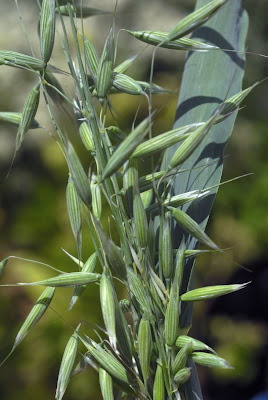 Elderberry - An Herb for Flu Season
Elderberry - An Herb for Flu Season
Elderberry (Sambucus canadensis, Sambucus nigra)
By Ursula Basch
Her
bal Bear School of Botanical Medicine Elderberries have been used as an herbal remedy for centuries. Widely used in North America, Europe, Western Asia, and North Africa, Elderberry is used for its antioxidant activity to boost the immune system, for coughs, colds, flu, bacterial and viral infections. In a placebo-controlled double-blind study, Elderberry was shown to be effective for treating Influenza B.1 with the result that those who took elderberry juice reported less severe symptoms and felt better much faster than those who did not.
A recent study in 2009 2 showed that Elderberry extract inhibited Human Influenza A (H1N1) infection. Flavonoids from the Elderberry extract bind to H1N1 virions and, when bound, block the ability of the viruses to infect host cells.
Elderberries contain organic pigments, tannin, amino acids, carotenoids, flavonoids, sugar, rutin, viburnic acid, vitaman A and B and a large amount of vitamin C. Elderberry anthocyanins enhance immune function by boosting the production of cytokines. Cytokines act as messengers in the immune system to help regulate immune response, helping to defend the body against disease. The anthocyanins found in elderberries possess appreciably more antioxidant capacity than either vitamin E or vitamin C 3.
Elderberries are also mildly laxative, diuretic, and diaphoretic. Flavonoids, including quercetin, are believed to account for the therapeutic actions of the elderberry flowers and berries. According to test tube studies these flavonoids include anthocyanins that are powerful antioxidants and protect cells against damage.
1. J Alt Compl Mod 1995: 1:361-69
2. Phytochemistry. 2009 Jul;70(10):1255-61. Epub 2009 Aug 12.Elderberry flavonoids bind to and prevent H1N1 infection in vitro.
3. Youdim KA, Martin A, Joseph JA. Incorporation of the elderberry anthocyanins by endothelial cells increases protection against oxidative stress.
 Making Elderberry Syrup
Making Elderberry SyrupMakes 1 quart
Make sure the cookware you're using is made of stainless steel. If you use an aluminum or enamel the juice from the elderberries will stain the cookware purple.
Ingedients:
2-pounds elderberries - be sure to remove all woody stems.
4 cups water
2½ cups sugar
1 tsp. freshly-squeezed lemon juice
Method:
1. Place the elderberries in a large, stainelss steel pot with the water. Bring to a boil and then reduce heat to a simer and cook for 15-20 minutes, until tender and soft.
2. Pass through a food mill or a sine mesh strainer and discard the skins.
3. Pour the juice back into the pot, add sugar, and cook at a low boil over moderate heat for 15 minutes, until the syrup has thickened. Add a spritz of lemon juice. Cool completely.
4. Pour into a bottle or jar and store in the refrigerator.
Elderberry Syrup is delicious used over pancakes, waffles or added to plain yogurt.
 Upcoming Classes:
Upcoming Classes: The Herbal Bear offers short one day classes on a variety of herbal topics. To view a full description of the class or to register on line for any class please click on the individual class.
- An Introduction to Herbal Medicine - Friday, February 19, 2010; 6:30pm - 8:00pm NYC
- Herbal Soap Making - Friday, February 26, 2010 6:30pm - 8:30pm NYC
- Herbal Spa Workshop - Feb 20, 2010; 2pm - 4pm NYBG
- Medical Botany - 6 Classes: Sundays; Feb. 21, 2010 to Mar 28, 2010; 2pm - 4pm NYBG
- Herbal Soap Making - Friday, March 5, 2010 6:30pm - 8:30pm NYC
- An Introduction to Herbal Medicine - Friday, March 12, 2010; 6:30pm - 8:00pm NYC
- Herbal Preparations Workshop - Friday, March 19, 2009; 6:30pm - 8:00pm NYC
- Herbal Soap Making - Friday, March 26, 2010 6:30pm - 8:30pm NYC
- Holistic Approaches to Stress Relief - Friday, April 9, 2010 6:30pm - 8:30pm NYC
- Herbal Soap Making - Friday, April 16, 2010 6:30pm - 8:30pm NYC
- An Introduction to Herbal Medicine - Friday, April 23, 2010; 6:30pm - 8:00pm NYC
- An Herbal Approach to Menopause - Friday, April 30, 2010; 6:30pm - 8:00pm NYC
- Herbal Soap Making - Saturday, April 17, 2010; 3pm - 5pm Grand Gorge, NY
- An Introduction to Herbal Medicine - Sat., May 8, 2010; 3pm - 4:30pm Grand Gorge, NY

2010 Botanical Medicine Program
We are currently accepting applications for the 2010 Botanical Medicine Program.
A six-weekend intensive program for those interested in a well rounded education in herbal studies. This class is designed to give students a solid foundation in herbalism. Each class we will learn about herbs for the different systems including: the digestive, nervous, cardiac, reproductive, and immune system. Students will learn plant identification, harvesting techniques, medicinal plant preparations and herbal formula development. This class is held in the Northern Catskills on a private 30 acre property. Many of the medicinal plants we study are growing in our gardens or found on our property. Unlike other herbals classes, this class incorporates field work with the plants. You will be able to see, study and harvest medicinal plants throughout the entire growing season. This class is designed for beginning and intermediate herbal students. For a full description of this class - please follow this link
If you have any specific questions about our programs, please feel free to contact us.













